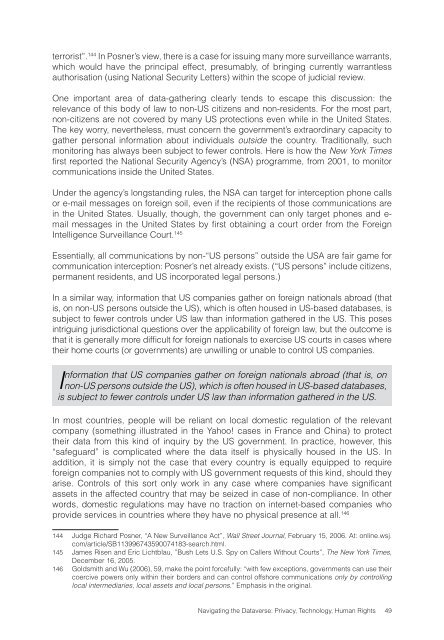Navigating the Dataverse: Privacy, Technology ... - The ICHRP
Navigating the Dataverse: Privacy, Technology ... - The ICHRP
Navigating the Dataverse: Privacy, Technology ... - The ICHRP
You also want an ePaper? Increase the reach of your titles
YUMPU automatically turns print PDFs into web optimized ePapers that Google loves.
terrorist”. 144 In Posner’s view, <strong>the</strong>re is a case for issuing many more surveillance warrants,<br />
which would have <strong>the</strong> principal effect, presumably, of bringing currently warrantless<br />
authorisation (using National Security Letters) within <strong>the</strong> scope of judicial review.<br />
One important area of data-ga<strong>the</strong>ring clearly tends to escape this discussion: <strong>the</strong><br />
relevance of this body of law to non-US citizens and non-residents. For <strong>the</strong> most part,<br />
non-citizens are not covered by many US protections even while in <strong>the</strong> United States.<br />
<strong>The</strong> key worry, never<strong>the</strong>less, must concern <strong>the</strong> government’s extraordinary capacity to<br />
ga<strong>the</strong>r personal information about individuals outside <strong>the</strong> country. Traditionally, such<br />
monitoring has always been subject to fewer controls. Here is how <strong>the</strong> New York Times<br />
first reported <strong>the</strong> National Security Agency’s (NSA) programme, from 2001, to monitor<br />
communications inside <strong>the</strong> United States.<br />
Under <strong>the</strong> agency’s longstanding rules, <strong>the</strong> NSA can target for interception phone calls<br />
or e-mail messages on foreign soil, even if <strong>the</strong> recipients of those communications are<br />
in <strong>the</strong> United States. Usually, though, <strong>the</strong> government can only target phones and e-<br />
mail messages in <strong>the</strong> United States by first obtaining a court order from <strong>the</strong> Foreign<br />
Intelligence Surveillance Court. 145<br />
Essentially, all communications by non-“US persons” outside <strong>the</strong> USA are fair game for<br />
communication interception: Posner’s net already exists. (“US persons” include citizens,<br />
permanent residents, and US incorporated legal persons.)<br />
In a similar way, information that US companies ga<strong>the</strong>r on foreign nationals abroad (that<br />
is, on non-US persons outside <strong>the</strong> US), which is often housed in US-based databases, is<br />
subject to fewer controls under US law than information ga<strong>the</strong>red in <strong>the</strong> US. This poses<br />
intriguing jurisdictional questions over <strong>the</strong> applicability of foreign law, but <strong>the</strong> outcome is<br />
that it is generally more difficult for foreign nationals to exercise US courts in cases where<br />
<strong>the</strong>ir home courts (or governments) are unwilling or unable to control US companies.<br />
Information that US companies ga<strong>the</strong>r on foreign nationals abroad (that is, on<br />
non-US persons outside <strong>the</strong> US), which is often housed in US-based databases,<br />
is subject to fewer controls under US law than information ga<strong>the</strong>red in <strong>the</strong> US.<br />
In most countries, people will be reliant on local domestic regulation of <strong>the</strong> relevant<br />
company (something illustrated in <strong>the</strong> Yahoo! cases in France and China) to protect<br />
<strong>the</strong>ir data from this kind of inquiry by <strong>the</strong> US government. In practice, however, this<br />
“safeguard” is complicated where <strong>the</strong> data itself is physically housed in <strong>the</strong> US. In<br />
addition, it is simply not <strong>the</strong> case that every country is equally equipped to require<br />
foreign companies not to comply with US government requests of this kind, should <strong>the</strong>y<br />
arise. Controls of this sort only work in any case where companies have significant<br />
assets in <strong>the</strong> affected country that may be seized in case of non-compliance. In o<strong>the</strong>r<br />
words, domestic regulations may have no traction on internet-based companies who<br />
provide services in countries where <strong>the</strong>y have no physical presence at all. 146<br />
144 Judge Richard Posner, “A New Surveillance Act”, Wall Street Journal, February 15, 2006. At: online.wsj.<br />
com/article/SB113996743590074183-search.html.<br />
145 James Risen and Eric Lichtblau, ”Bush Lets U.S. Spy on Callers Without Courts”, <strong>The</strong> New York Times,<br />
December 16, 2005.<br />
146 Goldsmith and Wu (2006), 59, make <strong>the</strong> point forcefully: “with few exceptions, governments can use <strong>the</strong>ir<br />
coercive powers only within <strong>the</strong>ir borders and can control offshore communications only by controlling<br />
local intermediaries, local assets and local persons.” Emphasis in <strong>the</strong> original.<br />
<strong>Navigating</strong> <strong>the</strong> <strong>Dataverse</strong>: <strong>Privacy</strong>, <strong>Technology</strong>, Human Rights 49
















